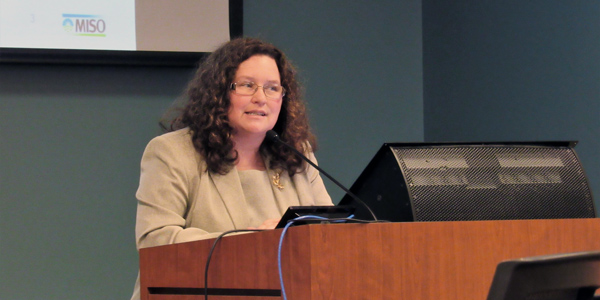By Amanda Durish Cook
While MISO is no closer to establishing its version of what constitutes grid “resilience,” the RTO last week said it stands ready to study certain ancillary services to help the U.S. Department of Energy develop its understanding of a concept that is getting increasing industry play through Secretary Rick Perry’s efforts.
“It’s a term I hadn’t heard before,” MISO Director of Market Engineering Kim Sperry said at an Oct. 5 Reliability Subcommittee meeting.
Sperry said that when baseload generators were built, industry officials could not have predicted that natural gas prices would drop so low and that wind and other renewables would receive such heavy investment. From MISO’s perspective, the recent DOE grid study focuses particularly on “premature retirements,” she said. (See Perry Grid Study Seeks to Aid Coal, Nuclear Generation.)
In response to the report, MISO is willing to embark on new studies focusing on frequency control, ramping, voltage support, inertia and inertial response — all to better identify the features of a “resilient” generator, Sperry said.
“There is going to be opportunities for more research, and MISO is willing to assist in that research,” she said.
RSC Chair Tony Jankowski said the subcommittee and MISO should spend more time defining resiliency before attempting to study its aspects.
“We need to make sure when they say ‘resiliency’ that we understand what is meant,” Jankowski said, referring to the Energy Department. “If not, we’ll have to pay for a coal pile or a fuel rod, and that isn’t the end-all of resiliency.”
Gabel Associates attorney Travis Stewart echoed Jankowski’s thoughts. “As we’re walking down the pathway of defining this concept, could we also spend time differentiating between resilience and reliability? While it appears that they’re intrinsically linked items, they’re also distinct,” he said.
“Lights are on today — that’s reliable, but it doesn’t mean it’s resilient,” Jankowski added.
Sperry took down all points to include in future discussions on MISO’s exploration of the topic.
Patrick Clarey, FERC‘s liaison to MISO, said stakeholders have until Oct. 23 to comment on Perry’s Notice of Proposed Rulemaking, which asks FERC to ensure that generators with 90 days of on-site fuel supply receive “full recovery” of their costs (RM18-1). (See FERC’s Independence to be Tested by DOE NOPR.)
Some MISO stakeholders said the proposed rulemaking sounded like a measure to guarantee returns for some independent power producers.
Clarey declined to further explain the NOPR, instead saying he would let it “speak for itself.”
“I’m not going to speculate on what’s behind it. I will say it is unusual. It’s only happened a handful of times,” he said.





